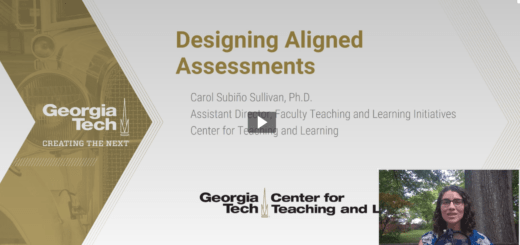Reaching Students through Online Teaching: David Joyner

Former student and TA Angela Smiley states, “Genuine excellence as an instructor requires not just the highly visible work of teaching in class but also the almost-invisible work of mentoring individuals and working behind the scenes to strengthen the institution. Dr. Joyner has embraced all these tasks.” As this student’s quote illustrates, Dr. David Joyner, Senior Research Associate and Associate Director of Student Experience in Georgia Tech’s College of Computing, that despite having around 200 students each semester, his teaching impacts each person in his online courses. Read more below about how this award-winning faculty member utilizes the online learning environment to better connect with his students.
From Job to Calling
Dr. Joyner started teaching online while he was getting his master’s degree in 2014. He found that he really enjoyed teaching online, getting to have close interactions with students and teach something he was passionate about without having to stand up and speak in front of a large group of people. When starting the job, it was more so of a way to work on his computer science skills while getting paid and getting his PhD all at once.
But upon starting, Dr. Joyner realized that it was an exciting opportunity to challenge himself and others in the computer science field to new levels of expertise. “Nothing inspired me to start online teaching, I started it and discovered it was inspiring.” Since the start of his online teaching career, Joyner has taught over 7,000 students and four online courses: Intro to Computing (CS 1301), Human-Computer Interaction (CS 6750), Educational Technology (CS 6460), and Knowledge-Based Artificial Intelligence (CS 7637).
started it and discovered it was inspiring.” Since the start of his online teaching career, Joyner has taught over 7,000 students and four online courses: Intro to Computing (CS 1301), Human-Computer Interaction (CS 6750), Educational Technology (CS 6460), and Knowledge-Based Artificial Intelligence (CS 7637).
In addition to his teaching, David Joyner is one of the most influential researchers in the computer science education field and has published papers in AI magazine, ACM’s Learning @ Scale conference, the symposium on Educational Advances in AI, and more. He has been awarded a gift by Mozilla Firefox to explore the use of virtual reality in online learning. He is also the co-PI on a grant from the National Science Foundation to examine the effect of and emotional response of students to individualized online lecture material.
This year, Joyner was selected as the winner of the inaugural Teaching Excellence Award for Online Teaching from the Center for Teaching and Learning. David also won the 2019 Regent’s Award for Online Teaching from the University System of Georgia. In his nomination letters for both awards, former Dean of the College of Computing, Zvi Gallil wrote, “For the past four years, David has been at the forefront of innovative online curriculum development, both as a teacher and as a researcher.”
Classroom Strategies
Because Joyner’s courses are online, his strategies differ from those you would see in a traditional classroom setting. He teaches his students through video lessons with formative assessments interspersed between them. These formative assessments include things like multiple choice questions relating to the content of the video and code-debugging questions. These questions can be answered multiple times until the student gets them right. He also has open discussion questions for students to answer and discuss with him and amongst each other.
He also allows, and recommends, the cultivation of student ownership within the classroom. Letting the students introduce relevant discussions they’re interested in can help to create a more positive educational environment. “One of the difficulties of a traditional classroom is the constraint of time,” Joyner claims. “A student might find a really interesting article on a topic relating to the course and want to discuss it in the class. But no student is going to approach a teacher and basically say: ‘Oh, I found this really cool article and want to forego the lesson plan you had for today to discuss it.’ Because the online classroom is open 24 hours a day, a student can simply post an article and discuss it with students without disrupting the class because both the discussion and the content of the course will always be available.” This gives students the flexibility to explore the content more thoroughly in and out of the virtual class.
Another crucial strategy in his teaching is the use of analogies, which has been a long-term interest as his research in graduate school focused on the use of analogies in learning environments. Students learn best through analogies and real-world examples because they allow students to relate new, unfamiliar content to things more personal and familiar to them. These connections help students create a deeper understanding of course content. Joyner puts great emphasis on analogies in his Human-Computer Interaction (CS 6750) course. Unlike in his other courses where he conducts video lectures in front of a slideshow or whiteboard, the video lectures for CS 6750 take place in the real-world. Videos are recorded in every day environments, like cars or kitchens, where Joyner interacts with the technology around him to emphasize how we interact with computer science in everyday life.
Reaching the Students
Joyner’s courses are primarily targeted towards students in the College of Computing, but Introduction to Computer Science (1301) and Human-Computer Interaction (CS 6750) are open to a variety of majors across campus at both the undergraduate and graduate levels.
Most students, graduate or undergraduate are already interested in taking his course because it’s online. Unlike physical courses, where classes only meet for around an hour two to three times a week, online courses are open all day so students can move through the content at their own pace.
Graduate students are especially appreciative of the flexibility. “Grad students can’t always afford, nor do they always have time, to travel or live on campus when they have jobs or families,” says Joyner, “So online is really beneficial in that it’s not as expensive as travelling to campus would be and it’s much more flexible so they can fit it into their schedule without having to drop anything in their lives to do it.”
While students are attracted to the course because of the flexibility of the online learning environment, engaging them in the course is more difficult. Joyner believes engaging students is more heuristic than planned out. “It’s less of a top-down plan about how to engage students,” he states, “And more so wrinkles that can be fit into the curriculum as you go along.”
Students are incentivized to participate because they receive credit for watching the lectures and for completing the assessments that come with each one. Students are also engaged by the teacher’s quick feedback on how to improve on assignments, the many formative assessment opportunities, and open discussion forums that allow the teacher or the students to discuss content relevant to the course.
Joyner engages students in CS 6460 Educational Technology through his use of self-proposed projects, an idea inspired by his colleague, Georgia Tech professor Ellen Yi-Luen Do. For this course, rather than the professor assigning a project, graduate students are invited to come forward with a project proposal of their own that covers something they are interested in researching and working on in the computer science field. Students are encouraged to explore the course subject and work on the areas that most interest them.
New to Teaching Online
For professors new to online education, Joyner feels it’s important to first consider whether it is a good fit for you. He comments, “I think it’s important to consider these two questions: is online teaching as effective as traditional teaching, and is it as fulfilling?”
Joyner believes online education can be equally as fulfilling as education in a traditional classroom setting depending on what aspects of teachings you most enjoy. “Online teaching allows for more student-teacher interaction and a deeper connection with the student community,” he states. “However, it also takes away the public speaking element that professors have when they educate students in a physical classroom setting; if that’s something you enjoy about teaching, then online teaching may feel like a sort of stripped-down version of teaching to you.”
As for the effectiveness of online education, David Joyner believes it isn’t inherently as effective as teaching in a traditional classroom but has a lot of potential to be equally, if not more effective, when used the right way. “Too much of the online environment is just using the internet to do the same thing you’d do in person,” Joyner states, “But I think what we should all try to do is use the online platform to develop a new experience from the ground-up.”
Those interested in learning more about teaching online can explore the following resources:
- The University of Central Florida’s Teaching Online Pedagogical Repository web page
- The paper, “How to Be a Better Online Teacher” recently published in the Chronicle of Higher Education




